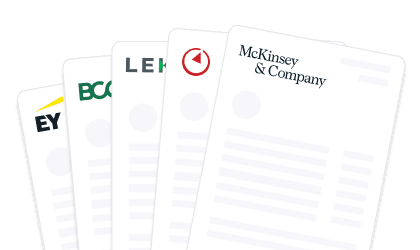How to Become a Management Consultant: Timeline, Requirements, & Tips (2025)
Learn how to become a management consultant with a step-by-step guide, expert tips, and real-world insights from top firms and former consultants.
Posted September 25, 2025

Join a free event
Learn from top coaches and industry experts in live, interactive sessions you can join for free.
Table of Contents
Management consulting is one of the most competitive, fast-paced, and intellectually demanding careers available. It promises high salaries, accelerated career progression, and a front-row seat to solving critical business problems for global clients. But how do you actually become a management consultant in 2025?
Whether you're a college student, an MBA candidate, or a working professional considering a career pivot, this comprehensive guide will walk you through the key requirements, timeline, and tactical steps to break into management consulting and thrive.
What Is Management Consulting?
Management consulting involves helping organizations solve complex business problems, improve processes, and implement strategies for growth. Consultants work across industries and functions, often under tight deadlines and high expectations, to deliver tailored solutions that drive results.
Consulting firms are typically hired by executives seeking an outside perspective, deep expertise, and analytical horsepower to address business issues they can't solve internally. Projects may involve data analysis, market research, strategy development, technology implementation, or operational transformation.
Top management consulting firms like McKinsey, BCG, and Bain (often referred to as MBB) are known for hiring elite talent, offering extensive training, and setting a high bar for performance. But boutique firms, industry-specific consultancies, and in-house corporate strategy teams also offer rewarding consulting careers.
Read: Top 5 Tips on Breaking Into Consulting (From an Ex-Bain Interviewer)
Why Become a Management Consultant?
People pursue management consulting for a variety of reasons:
- Exposure to high-impact projects across industries
- Opportunities to work directly with executives and decision-makers
- Development of transferable analytical skills, leadership skills, and business acumen
- Access to high salaries, fast-paced learning environments, and strong career progression
- Attractive exit opportunities in private equity, tech, startups, and industry roles
According to former consultants on Reddit, the job can be a “career accelerator” but it also comes with trade-offs: long hours, frequent travel, and high expectations. It's not just about prestige or pay; succeeding in consulting requires grit, adaptability, and a deep interest in solving business problems.
Effective Strategies to Become a Management Consultant
Becoming a management consultant in 2025 requires more than great grades or a polished resume; it demands a well-executed strategy based on where you are in your career. Whether you’re an undergrad, an MBA, or an experienced professional, your path in will look different. What follows are proven, expert-backed approaches for each.
Undergraduates: Start Early and Signal Sharpness
If you’re an undergrad, the recruiting game starts sooner than most people realize. Consulting firms scout for top candidates during sophomore and junior years, and your summer internship before senior year is your single best shot at securing a full-time position.
Your major helps (business, econ, STEM all work), but what really sets candidates apart is involvement in consulting clubs, case competitions, and leadership roles. Firms want to see structured thinkers, collaborative teammates, and students who’ve already begun solving business problems.
Expert Tip: “Consulting is about impact. In your resume and interviews, show how you changed something (grew revenue, launched a new process, improved a system). That’s more impressive than just listing your role.”- Former BCG Recruiter
Networking is everything. Start attending coffee chats, reaching out to alumni, and building your professional network early. The best candidates are often already known to recruiters before they ever submit a resume.
Student Case Study: Sarah, a junior at Georgetown, didn’t have a perfect GPA, but she ran her school’s case team, interned at a nonprofit strategy org, and built real relationships with Bain consultants through on-campus events. She landed the internship over peers with stronger academic credentials.
MBAs and Advanced Degree Candidates: Maximize Every Touchpoint
If you’re in an MBA program or have an advanced degree (PhD, JD, etc.), top firms will be recruiting at your school, but you’ll be competing against classmates with impressive pre-MBA experience. Preparation starts before the program even begins.
Use your pre-MBA summer to build relationships and get an insider perspective. Join firm-sponsored programs and connect with second-years who’ve landed consulting offers. They’re often your best resource for interview prep, firm culture insights, and what actually matters to recruiters.
On the Ground Insight: “The biggest mistake I made was waiting until September to network. By then, some people had already been recommended by interns or second-years. Relationships matter more than people think.” - Reddit user, r/consulting
Case prep is its own beast. Get comfortable with ambiguity, sharpen your mental math, and practice storytelling for behavioral interviews. Many MBA students underestimate how much prior experience in leadership, data analysis, or project management helps. Use your summer internship to lock in a return offer; it’s your best shot at securing long-term stability.
Experienced Professionals: Position Yourself as a Specialist
If you’re coming from industry, your goal isn’t to imitate a business student; it’s to own how you gain expertise and translate it into consulting value. Firms are increasingly hiring experienced professionals who can bring a track record of execution in a particular area, from technology to operations to marketing.
The strategy? Reframe your existing experience. Highlight how you’ve solved real business problems, improved systems, influenced executives, or driven measurable outcomes. You need to show not just what you did, but how you thought.
Real Talk: “You don’t have to come from McKinsey to think like a consultant. I led operational turnarounds at a logistics company—by my third interview, I had multiple offers from boutiques and even one from Bain.” - Management Consultant (experienced hire), via Reddit
You’ll likely apply through company websites, referrals, or niche recruiters. Boutique and mid-size consulting firms tend to be more flexible and interested in diverse backgrounds. Once inside, the path to top-tier strategy work becomes more accessible.
Industry Pivot Case Study: Anisha, a healthcare operations manager, used her Lean Six Sigma certification and 6 years of experience to land a role at ZS Associates. Within 18 months, she transitioned into strategy-focused roles with pharmaceutical clients and is now targeting a role at BCG’s healthcare practice.
Bonus: Must-Have Tactics That Work Across All Entry Points
- Build a referral engine: Reach out to 10–20 people per month on LinkedIn. Ask for insights, not favors. Then stay top-of-mind.
- Polish your materials: Your cover letter should explain why consulting, why now, and why you. Generic = rejected.
- Get real feedback: Don’t just run cases with peers. Practice with actual consultants or coaches who’ve done it.
- Track firm timelines: Use company websites, school portals, and newsletters. Many deadlines are earlier than expected.
Management Consulting Application Timeline (2025)
Consulting recruiting is highly structured, especially for undergrads and MBA students. Missing key deadlines (even by a few days) can cost you your shot at a top firm. Below is a month-by-month guide for 2025 recruiting based on actual timelines from MBB, Big 4, and top boutique firms.
For Undergraduates (Class of 2026):
| Timeframe | What to Do |
|---|---|
| Jan–Mar 2025 | Prep resumes and cover letters, build your professional network, attend coffee chats, and apply for diversity or spring programs. |
| Apr–Jun 2025 | Begin case interview prep and stay close to recruiters. Some firms host pre-summer resume drops. |
| Jun–Jul 2025 | Submit applications for summer internships (junior year). Deadlines can be as early as July 1. |
| Aug–Sep 2025 | Interview season: complete case interviews, fit interviews, and first/second rounds. Offers often come by mid-September. |
| Oct–Nov 2025 | If you didn’t get an offer, consider boutique firms or firms hiring off-cycle. Keep networking and refining your story. |
For MBA Students (Class of 2026):
| Timeframe | What to Do |
|---|---|
| Apr–Jun 2025 | Network before your program starts. Join consulting career prep programs and meet second-years with consulting offers. |
| Jul–Aug 2025 | Attend firm events during pre-MBA summer. Polish your resume and start case prep early. |
| Sep–Oct 2025 | Submit applications for summer internships (first-year MBAs). MBB deadlines usually fall in October. |
| Nov–Dec 2025 | Interviews begin: prep intensively for case interviews and behavioral rounds. Offers typically come in late Nov or early Dec. |
| Jan–Mar 2026 | For those without an offer, look at consulting jobs at smaller firms or particular areas like technology or project management. |
For Experienced Hires:
- No fixed cycle, but expect 3–6 months from application to offer.
- Apply strategically based on firm openings and industry demand.
- Leverage your prior experience, industry expertise, and professional network.
- Experienced hiring spikes in Q1 and Q3, especially when firms reassess project pipelines and development needs.
Read: Consulting Recruiting Timeline (2025): Dates, Deadlines & Strategy and List of Consulting Deadlines for MBB & Big 4 (2025-2026)
Pro Tip: MBB and top firms rarely interview on a rolling basis, so apply early. Use firm company websites and recruiter newsletters to track deadlines.
Core Requirements and Skills for Consulting Roles
Top consulting firms don’t just hire the smartest person in the room; they hire people who can think clearly under pressure, communicate with impact, and build trust with clients. To break in (and thrive), you’ll need to demonstrate both technical capabilities and professional polish.
Here’s what firms like McKinsey, BCG, Bain, and top boutique consulting firms actually look for in successful hires and how to prove you have what it takes:
Key Skills Every Management Consultant Needs
- Structured Problem Solving - This is the core of the job. Consultants are hired to solve complex, ambiguous business problems quickly and logically. You’ll need to break down messy issues into clear components, prioritize ruthlessly, and drive toward actionable insights. In interviews, this is assessed through case interviews, but in practice, it shows up in every client meeting.
- Analytical Skills & Data Analysis - Whether you're working with a startup or Fortune 500 client, decisions must be backed by data. Expect to work with large, messy datasets, build models, and extract insights that support your recommendations. Comfort with Excel, SQL, and basic visualization tools (like Tableau or Power BI) is increasingly expected.
- Conducting Research & Synthesizing Insights - Consultants spend a surprising amount of time gathering inputs, consulting interviews, benchmarks, and market research, and distilling that into clear takeaways. You need to be both investigative and insightful: knowing what to look for, how to find it, and how to make it relevant for the client’s needs.
- Communication with Clients & Executives - You’ll be in rooms with C-level stakeholders early in your career. The ability to speak clearly, write persuasively, and present confidently is non-negotiable. It’s not just about being articulate; it’s about shaping your message for the audience and building credibility fast.
- Leadership, Teamwork & Adaptability - Even as a junior team member, you'll own workstreams and interact directly with clients. Consultants need to lead from day one: navigating tight deadlines, shifting priorities, and diverse personalities on small teams. The best consultants show initiative without ego.
- Attention to Detail & Comfort with Ambiguity - The margin for error is thin. A wrong number in a model or a typo in a deck can erode trust. At the same time, you’re rarely given perfect data or clarity, so firms value people who can make sound decisions with incomplete information and still deliver sharp, error-free work.
Insider Insight: “Everyone at MBB is smart. The ones who get promoted are those who can simplify complexity, build client trust, and execute without hand-holding.” - Former Bain Manager
Relevant Credentials & Requirements
- Degree from a Top Business School or Quantitative Discipline - For entry-level roles, firms recruit heavily from target undergrad programs and elite MBA programs. If you're applying from a non-target background, you’ll need to show exceptional achievements and strong networking to get noticed.
- Strong Academic Track Record - A high GPA (3.6+) and solid standardized test scores (SAT/GMAT/GRE) help signal analytical rigor, especially at the resume screen stage. For MBA students, firms often look at undergrad GPA as well.
- Tailored Resume & Cover Letter - Generic won’t cut it. Your resume should highlight impact, not just responsibilities. Your cover letter should clearly explain why consulting, why that firm, and why now. Firms read it, and it can tip the scale.
- Mastery of Case & Behavioral Interviews - You must be excellent at both. Case interviews assess your logic, structure, and business sense. Behavioral interviews test your leadership, collaboration, and resilience. Firms want people who can not only crack the case but also bring others along with them.
- (Optional) Certified Management Consultant (CMC) Designation - This credential is rarely required, but can be valuable for experienced hires, independent consultants, or those targeting niche management consultancy roles. It signals credibility and commitment to the profession.
Pro Tip: “If you're a non-traditional candidate, your edge isn't hiding your background, it’s reframing it as relevant expertise the firm doesn’t already have.” - Boutique Consulting Founder
Types of Consulting Firms to Target
Choosing the right type of consulting firm can dramatically shape your experience, lifestyle, and career trajectory. Below is a strategic comparison of the major categories, including the types of projects you’ll work on, the skills you'll develop, and what your long-term career progression might look like.
| Firm Type | Examples | What They’re Known For | Ideal For Candidates Who… |
|---|---|---|---|
| MBB (Top 3 Strategy) | McKinsey & Co, Boston Consulting Group, Bain & Co | Elite global firms that advise Fortune 500 clients on strategy, transformation, and innovation. Offer top-tier training, fast promotion, and high-exit optionality (PE, VC, startups, leadership). | Want global brand equity, world-class mentorship, and are willing to handle intense hours and steep expectations. |
| Big 4 Consulting Arms | Deloitte Consulting, PwC Strategy&, EY-Parthenon, KPMG Advisory | Massive scale and variety, strong in implementation, operations, tech transformation, and risk advisory. Increasing push into strategy via acquisitions. More structured paths and slightly better work-life balance. | Want broader exposure across industries/functions and value brand strength with more predictability and resources. |
| Boutique/Niche Firms | L.E.K. Consulting, Oliver Wyman, ZS Associates, ClearView, Simon-Kucher | Specialized expertise in specific industries (healthcare, life sciences, pricing, fintech, etc.) or functions (marketing, sales, analytics). Projects are shorter, teams leaner. | Are passionate about a particular domain and want to build deep expertise quickly in a focused, collaborative setting. |
| In-House Strategy Teams | Google, Amazon, Meta, Salesforce, Johnson & Johnson | Internal consulting groups solving strategic problems for the company, without client travel. Great exposure to business operations and high-level decision-making. Often a launchpad into internal leadership roles. | Want strategic work without the consulting lifestyle; strong fit for post-MBA or ex-consultants seeking stability. |
| Independent/Freelance | Toptal, Umbrex, BTG, solo consulting brands | Experienced consultants offering short-term, project-based consulting to clients. Grows via network, reputation, and niche expertise. Flexibility, autonomy, and upside, but no safety net. | Are experienced professionals seeking control over their work, income, and clients. Often ideal post-MBB or after 10+ years. |
Each firm type looks for different traits. Before you apply, study the firm’s job description, culture, and focus areas. Some value academic pedigree and case skills; others prioritize industry experience, technical skills, or client empathy.
Insider Tip: “Don’t chase logos, chase fit. Where you thrive will depend more on the people, project types, and support systems than the brand alone.” - Former Consultant, BCG and EY-Parthenon
Read: The 10 Best Consulting Firms to Work For Now
How to Stand Out in the Application Process
Landing a role at a top management consulting firm isn’t just about being smart; it’s about being strategic. With thousands of candidates competing for a handful of spots, the ones who break through are those who understand how to position themselves with precision. Here’s what it takes to rise to the top of the resume stack, earn interviews, and convert offers.
Tailor Your Resume and Cover Letter for Maximum Impact
A generic resume gets generic results. Your consulting resume should be a surgical demonstration of value built around impact, not job titles or responsibilities. Every bullet point should quantify results, demonstrate problem-solving, and show a pattern of initiative.
Firms are looking for people who’ve led projects, influenced teams, or delivered measurable results under pressure. That could be through a student organization, an internship, a startup, or even a research project. Your job is to connect those experiences to the key skills firms want: structured thinking, leadership, communication, and data-driven analysis.
Your cover letter is not filler. It’s your chance to tell the reader why you’re not just qualified, but a natural fit for their firm. Show that you understand their practice areas, client focus, and culture. If you’re coming from a non-traditional background, use the letter to turn that into a strength.
Expert Insight: “The structuring and the ability to write a well-written resume actually matter just as much as the content.” - Management Consulting Coach, Leland
Master the Case Interview Like a Consultant-in-Training
Firms want to see how you break down ambiguous problems, structure your thinking, and walk a client through to a recommendation. The best candidates approach it with a clear strategy: frameworks as tools (not crutches), sharp mental math, and crisp communication.
Beyond technical skills, your mindset matters. Curiosity, composure, and coachability go a long way. Interviewers often ask themselves: Would I want this person on my team at 2 am before a client meeting? Show them you can be that person.
Practicing with peers is a good start, but at a certain point, work with former consultants or coaches who can replicate real interview pressure and give professional feedback. You’re not just prepping answers, you’re training for a mindset.
Build a Strategic, Authentic Professional Network
Networking isn’t about blasting LinkedIn DMs. It’s about building real relationships with people who can help you understand the role, the firm, and the path. Strong applicants have done dozens of coffee chats, learned the language of the industry, and know how to communicate their “why consulting” story with clarity.
Start with alumni, campus events, and second-years who’ve interned at your target firms. Ask thoughtful questions, express genuine curiosity, and always follow up with a thank-you and an insight you took away. Referrals don’t come from one-off conversations; they come from consistency, credibility, and connection.
Remember: firms often extend interviews to candidates they’ve heard good things about internally. Being top of mind can make the difference when the resume pile gets cut in half.
Life After Consulting: What Are the Exit Opportunities?
Many management consultants transition into roles in:
- Private equity and venture capital
- Product or strategy roles at high-growth technology companies
- Corporate development or operations
- Starting their own companies or joining startups
As shared on Reddit, some ex-consultants felt that landing premium exit roles required more hustle than expected, especially beyond MBB. Networking, timing, and a strong track record of performance matter.
Read: Paths Into Consulting: Target, Non-Target, & Experienced Hire (Post-Grad)
Pro Tips from Real Consultants
“Get good at handling stress. Everyone is smart, your edge will be managing ambiguity and building relationships with clients.” – Former Bain Consultant
“Don’t romanticize exits. Focus on becoming excellent at the job. That’s what unlocks the best new opportunities.” – Reddit user
“Start networking early during your summer internship or even before. Firms hire from known quantities.” – Ex-McKinsey Analyst
Final Checklist: Are You Ready to Pursue Consulting?
Before you dive into applications or case prep, take a moment to assess where you stand and where to focus next. Becoming a management consultant is a competitive, high-stakes journey. But with the right preparation, it’s absolutely within reach.
Here’s your expert-approved readiness checklist:
- You understand what consulting actually is. You’ve researched the lifestyle, project types, and trade-offs, not just the perks. You know the difference between MBB, Big 4, and boutique firms, and what kind of work energizes you.
- You’ve clarified your “why consulting” story. You’re not chasing prestige; you have a clear reason for pursuing consulting, rooted in your skills, interests, and career goals. And you can articulate it authentically.
- Your resume and cover letter tell a story of impact. Every line demonstrates outcomes, not just responsibilities. You’ve aligned your materials to what firms actually value: problem solving, leadership, analytical rigor, and initiative.
- You’re building real relationships, not just collecting contacts. You’ve started networking early and intentionally with alumni, recruiters, and current consultants. You’re not asking for favors, you’re asking smart questions and showing genuine curiosity.
- You’re treating the case interview like a skill, not a script. You understand the mechanics of casing, but also the mindset. You’re practicing with peers and mentors, getting real feedback, and building comfort with ambiguity.
- You’re thinking long-term. You’re not just focused on the offer, you’re considering how consulting fits into your broader career. You know what kind of exit opportunities are realistic, and what you want to learn along the way.
If you checked most of these off, you’re in a strong position to succeed. If not, now’s the time to close those gaps. The consulting recruiting cycle doesn’t wait, and top firms expect polish from day one.
Final Thoughts: Is Management Consulting Right for You?
A consulting career can be incredibly rewarding, but it's not for everyone. The best candidates aren’t just smart but curious, coachable, and energized by tough business challenges. They’re lifelong learners with the resilience to navigate demanding environments.
Use the resources available: company websites, alumni, Reddit threads, and case prep books to make an informed decision. Know the lifestyle trade-offs, the career upside, and how your personal goals align with the consulting path.
If you're serious about pursuing consulting in 2025, start now. Build your skills, develop relationships, and take the first steps toward one of the most dynamic roles in business.
TL;DR: Becoming a management consultant takes intention, preparation, and hustle. But the doors it opens for your skills, network, and future roles can be transformational.
Ready to Land Your Consulting Offer?
Work 1:1 with a top management consulting coach who's broken into top consulting firms, from MBB to boutique strategy. Get personalized help with resumes, case interviews, and finding the right fit. Explore consulting coaches here. Also, check out our management consulting recruiting bootcamp and free management consulting events for more strategic insights!
See: The 10 Best Consulting Coaches for Case Interviews & Resumes
Read next:
- 50+ Case Interview Questions & Examples (MBB + Other Top Firms)
- How to Prepare for a Bain Case Interview
- McKinsey PEI Questions: Common Questions & Answers
- Case Interview Frameworks & When to Use Them
- Consulting Coffee Chats: The Ultimate Guide
FAQs About Becoming a Management Consultant
What degree do I need to become a management consultant?
- Most consultants have a degree in business, economics, or a quantitative field. Top firms also recruit from MBA programs and select advanced degree holders.
Do I need prior business experience?
- Not necessarily. Firms value analytical skills, structured thinking, and leadership. Demonstrating impact through internships, projects, or entrepreneurship helps.
How competitive is management consulting?
- Extremely. Acceptance rates at MBB are <1–3%. That’s why strong cover letters, networking, and case prep matter.
What’s the difference between strategy consulting and management consulting?
- Strategy consulting is a subset of management consulting, focused on big-picture initiatives like growth, M&A, or market entry. Management consulting also includes implementation, operations, and transformation.
Is the Certified Management Consultant (CMC) designation required?
- No, but it can add credibility for senior industry professionals or independent consultants.
Browse hundreds of expert coaches
Leland coaches have helped thousands of people achieve their goals. A dedicated mentor can make all the difference.


























